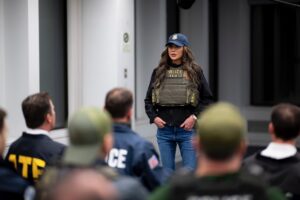Before Family Separations, the Trump Administration Quietly Removed Protections for Migrant Kids
Thanks to a series of policy changes, children's chances of finding asylum in the U.S. are slimmer than ever. Fatima Aleman Rodas, 14, fled El Salvador with her older sister in 2016. They were separated and detained. (Melissa Lyttle / Reveal)
Fatima Aleman Rodas, 14, fled El Salvador with her older sister in 2016. They were separated and detained. (Melissa Lyttle / Reveal)
Thousands of children separated from their parents after crossing the U.S. border eventually may be reunited, but children’s chances for asylum are slimmer than ever, thanks to a series of recent policy changes under the Trump administration.
Many of the changes happened quietly over the last 18 months, short-circuiting opportunities for children to get help and prove whether they are entitled to refugee status or asylum. Most give more power for final decisions about child deportation to officials at the border.
“The message is … if you come to the border, you are going to be detained and quickly removed,” said Charles Wheeler, a veteran immigration attorney who oversees training and advocacy in Oakland, California, for the Catholic Legal Immigration Network.
The recent shifts preceded the new policy to separate children from the adults they traveled with to get to the Mexico-U.S. border, and even if the executive order to reverse course holds, they will outlive that effort.
Laura Barrera, an immigration lawyer in Las Vegas, is representing a 10-year-old boy whom the federal government is considering deporting. After crossing the border from Mexico alone, the child was picked up by immigration authorities and eventually placed with a step parent—a legal U.S. resident.
But Barrera says the future of that child, like many others, is far from certain because of the steps the Trump administration has taken in recent months, including:
- Collecting and sharing more information, including fingerprints and resident status of adult sponsors and other adults in the household of children awaiting decisions. This data collection can discourage relatives or family friends already in the U.S. from coming forward to help the child, possibly leaving the child waiting in federal detention for months. However, administration officials counter that the data collection will enable officials to do a better job of keeping track of unaccompanied children while they await deportation decisions.
- Allowing immigration judges to revoke the designation of “unaccompanied” to exclude children from that category once they are placed in the custody of a responsible adult. This means children lose certain rights that give them extra time to make their claims, including at least two opportunities to collect documents and make a case to fight deportation.
- Requiring lawyers from the Department of Homeland Security to oppose any delays in deportation proceedings. Previously, state courts and federal agencies were given time to find safe housing for children while they determined the risk of returning them to their home country. “Now the Department of Homeland Security is fighting everything,” said Ashley Tabaddor, an immigration judge in Los Angeles and president of the National Association of Immigration Judges.
- Making it easier for a federal immigration judge to discount the validity of children’s testimony about the dangers they face. In recently issued guidelines, the Justice Department cautioned immigration judges that vague, speculative or generalized testimony may not meet the burden of proof required for asylum or refugee status. Critics say that contradicts immigration courts’ own requirements that judges take into account a child’s age, the fact that the child arrived in the U.S. unaccompanied and that he or she may be acting without a lawyer.
- Failing to renew a federal program that provided legal help to unaccompanied children. The AmeriCorps program had provided $4.4 million to nonprofit organizations that trained and recruited lawyers. It was not renewed nearly a year ago, even though the Vera Institute of Justice, a nonpartisan contractor and think tank with a long history of working with the Department of Justice, had found in a 2016 report that the program helped immigration courts run more smoothly. In early June, another program that would have provided legal aid to some unaccompanied children through funding from the Department of Health and Human Services was put on hold.
One Child’s Experience
The experience of Fatima Aleman Rodas, 14, was typical of how things worked before the Trump administration began changing procedures and challenging claims that children face greater risk in their home countries than in the U.S.
Fatima, who recently finished eighth grade in Bakersfield, California, fled El Salvador to join her mother and two brothers, who arrived several years ago and work in the fields. Fatima and her older sister, Brenda, had stayed behind in El Salvador, enduring a five-year separation from family members who had slipped into the U.S.
A few months before the 2016 presidential election, Fatima and Brenda walked for more than five weeks, eager to escape gang violence that included threats from Brenda’s father.
“We slept in the countryside,” Fatima said in Spanish. “People gave us food.”
Occasionally, they took a bus, and a relative had arranged some assistance from “coyotes”– men paid to help smuggle people across the borders.
When the sisters reached the U.S. border near Reynosa, Mexico, they were able to walk across, Fatima said, but quickly were spotted by U.S. immigration officials, picked up and separated.
Fatima was sent to a center for children in Texas, then to New York. Because of her age and because authorities were able to determine that they could release her to her mother – with help from the legal aid program that was not renewed – Fatima was released from detention after about a month. Until recently, that was pretty standard for many unaccompanied children. Brenda, who was 24 at the time, was detained a few weeks longer.
Now the family is applying for asylum.
Fighting state courts
Until recently, the federal government turned to state courts – which routinely deal with child welfare and custody issues – and the Office of Refugee Resettlement in the Department of Health and Human Services to determine where children would be safest.
Those decisions sometimes take months or years, as children or appointed representatives gather documents and other information about their families back home and in the U.S.
The administration’s lawyers now routinely oppose efforts by lawyers for unaccompanied children to delay deportation. When a state court does rule that staying with a guardian or parent in the U.S. is in the child’s best interest, Trump administration attorneys frequently challenge those findings.
Department of Homeland Security spokesman Tyler Houlton cited concerns about the trafficking of children to explain some of the policy changes.
“There have been numerous intelligence reports and cases where kids have been used and trafficked by unrelated adults in an effort to avoid detention,” he said in a March statement.
Last month, U.S. Attorney General Jeff Sessions amplified that, saying at a criminal justice conference in Scottsdale, Arizona: “If you are smuggling a child, then we will prosecute you and that child will be separated from you as required by law.”
Sessions also appeared to equate smuggling with any illegal entry with or without a parent, not just human trafficking.
“If you cross this border unlawfully, then we will prosecute you,” he said. “It’s that simple.”
Critics say targeting children is one route to achieve the broader administration goal of halting illegal border crossings and deterring family reunification even when some family members already are legal U.S. residents.
“This is the demonization of all immigrants and in particular the demonization of children,” said Jeanne Atkinson, executive director of the Catholic Legal Immigration Network.
Seeking legal aid
Hector, 20, also was represented by a nonprofit that had benefited from the AmeriCorps funding. Hector, who asked that his last name not be used, left Guatemala when he was 17 and now lives in Maryland with relatives who have received asylum.
Several family members were killed in what Hector said were revenge killings after another relative had been involved in a murder.
“They killed my family,” he said in a recent interview with Reveal, which his attorney, Jennifer Bibby-Gerth, observed. Hector met Bibby-Gerth through Catholic Charities, one of the most active nonprofits seeking to help immigrants. “First, they shot my uncle, then they killed my grandfather and shot my mother, then another uncle,” he said.
Hector talked of boarding a bus and traveling alone for 15 days, rarely with enough to eat. He crossed the U.S. border at night near Reynosa, Mexico, he said, swimming across the Rio Grande.
Hector walked alone for about a day, he said, searching for food and water. Then he was picked up by immigration officials and taken to a youth detention center in Texas.
While there, he turned 18 and was transferred to an adult detention center. He eventually connected with Catholic Charities in Houston, made his way to his relatives in Maryland and awaited word from the government about his petition for asylum.
His first petition was turned down two years ago by a hearing officer, but Bibby-Gerth filed an appeal, which is pending.
“The asylum officer was wrong,” Bibby-Gerth said. “It was one of the strongest cases for asylum I had ever seen.”
Hector was lucky. Michael Kagan, director of the University of Nevada, Las Vegas Immigration Clinic, said the demand for lawyers to represent children far outstripped the supply even before the recent cuts.
“The idea that anyone should go into deportation proceedings without any attorney really raises serious questions about whether immigration court is fair to people,” he said.
Children are especially vulnerable, he said. Not only are they young – some as young as 4 have been left to represent themselves – but some cannot read in any language.
The Las Vegas law clinic began with funding through the AmeriCorps program. When Kagan learned in spring 2017 that the Trump administration would not be renewing the program (it formally ended in the fall), the clinic was able to get a sizeable grant from a local law firm to continue its work.
But similar clinics around the country had to shut down their legal aid to unaccompanied kids, even while they were able to provide other immigration services.
Sarah Lackritz, a spokeswoman for Equal Justice Works – the nonprofit that administered the program for the Justice Department – said the organization is seeking new ways to assist legal clinics that had provided aid to unaccompanied children. Among them: trying to place legal fellows, including newly minted attorneys, in the clinics.
“We care about this work and are committed to finding new sources of funding to ensure that we have as many fellows working in the public interest field as possible,” she said in an email.
A lengthy process
The legal process from U.S. entry to a decision can take years – partly due to a caseload that grew as border crossings increased without commensurate growth in the ranks of federal immigration judges.
In a Dec. 5 memorandum, Sessions said the Justice Department was moving to hire more immigration judges. By May, the court backlog had grown to 714,000 cases – over 2,000 per judge.
Bills introduced this year in Congress would further increase the number of immigration judges, and that effort has been moving ahead.
Sen. John Cornyn, R-Texas, chairman of the Judiciary Committee’s subcommittee on border security and immigration, said he would support hiring more judges and wants to ease the backlog. In his home state, he said the wait for a final determination of legal status is nearly 900 days – about two and a half years.
Cornyn called that unacceptable.
“We know that these long delays can be frustrating and affect the lives of aliens with legitimate claims for relief,” he said at an April subcommittee hearing. While pushing for more immigration judges, he also has been trying to toughen penalties for those who enter the U.S. illegally.
Like President Donald Trump, Cornyn complained that the immigration system, including its courts, is failing to ensure that those who are granted a reprieve from deportation actually deserve to be in the U.S. Trump has been highly critical of the Department of Homeland Security and has blamed procedural delays for enabling gang members and criminals to slip across the border under the guise of seeking refugee or asylum status – some as unaccompanied children.
“We need to fix the loopholes in current laws that hamper the government’s ability to bar criminals, gang members and sex offenders from entering the United States or from being removed,” Cornyn said at the hearing.
As part of its effort to speed up deportation, the Trump administration has announced plans to impose a quota system on cases for already overworked immigration judges. Ashley Tabaddor, the Los Angeles immigration judge, said that may force them to close cases sooner than when the system has meted out due process to those applying, making it more likely that immigration court decisions could be overturned on appeal.
State courts and U.S. Citizenship and Immigration Services, part of the Department of Homeland Security, also are experiencing substantial backlogs in their assessments of unaccompanied children.
But they are widely considered by immigration lawyers to be well-suited to handle cases in which the “best interest of the child” standard is applied.
Turning instead to border hearing officers for those assessments could lead to more reversals, Tabaddor said. Hearing officers at the border and immigration judges in courtrooms across the country are being urged to make speedy decisions. They may lack pertinent information simply because the child – or his or her attorney – hasn’t had time to gather it.
Your support is crucial...As we navigate an uncertain 2025, with a new administration questioning press freedoms, the risks are clear: our ability to report freely is under threat.
Your tax-deductible donation enables us to dig deeper, delivering fearless investigative reporting and analysis that exposes the reality beneath the headlines — without compromise.
Now is the time to take action. Stand with our courageous journalists. Donate today to protect a free press, uphold democracy and uncover the stories that need to be told.







You need to be a supporter to comment.
There are currently no responses to this article.
Be the first to respond.